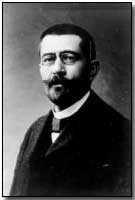Who's Who - Gustav Noske
 Gustav Noske (1868-1946)
was born on 9 July 1868 in Brandenburg. Having developed an early
interest in political affairs he joined the Social Democratic party (SPD),
becoming its Brandenburg chairman in 1892.
Gustav Noske (1868-1946)
was born on 9 July 1868 in Brandenburg. Having developed an early
interest in political affairs he joined the Social Democratic party (SPD),
becoming its Brandenburg chairman in 1892.
From 1897 Noske edited various SPD newspapers in Brandenburg in Voice of the People. He remained the latter's editor until 1918. In spite of his (admittedly right wing) social democrat background Noske took a surprising interest in colonial and military affairs. In Colonial Policy and Social Democracy, published in 1914, he demonstrated firm support for the principle of German colonial possessions. In 1906 Noske entered the Reichstag.
With the coming of war in August 1914 Noske was outspoken in his belief that national self-interest demanded an effective political truce between left and right. In this he struck a wartime alliance with both Ebert and Scheidemann. However Noske's commitment to the prosecution of the war waned as the government's war aims grew increasingly annexationist. He therefore came out in support of the (unsuccessful) Reichstag Peace Resolution of July 1917.
With the war coming to a close and revolution seemingly imminent, the government of Prince Max von Baden despatched Noske to Kiel as its Governor in an attempt to quell the widening naval mutiny. Despite some limited success on 6 November Noske reported that the mutiny had begun to spread.
With the war over and the Kaiser's decision to abdicate, Ebert - now at the head of a provisional government - recalled Noske to Berlin and handed him responsibility for the military governance of the capital on 28 December 1918. In this capacity Noske recruited the Freikorps which successfully put down the Spartacist rising the following month.
In February 1919 Scheidemann appointed Noske defence minister. However in March 1920 he resigned with his failure to ensure military backing against the right-wing Kapp Putsch.
Noske served from 1920-33 as upper president of Hanover, after which he settled in Frankfurt/Main. His retirement was by no means peaceful however. Arrested in July 1944 in connection with the failed assassination attempt upon Hitler, he was only released from a Gestapo prison in Berlin with Russia's conquest of the city.
Noske died on 30 November 1946 in Hanover aged 78.
Click here to read Lord Northcliffe's account of the early stages of the Battle of Verdun.
"Devil Dogs" was the nickname given to the U.S. Marines by the German Army.
- Did you know?
